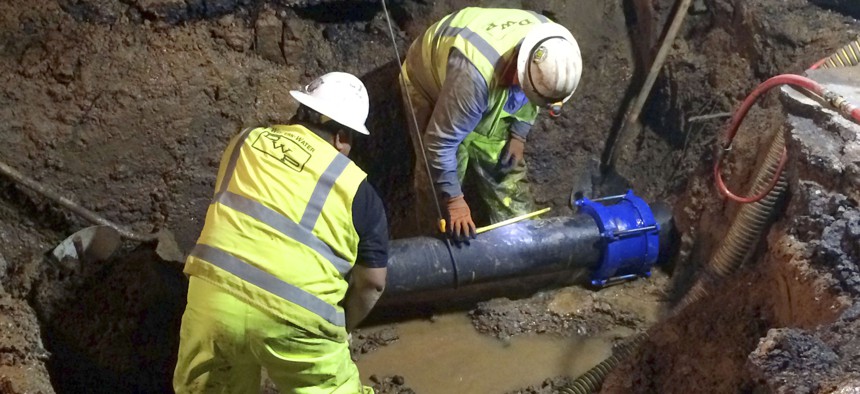Democrats Lay Down a Marker on Drinking Water and Sewer Funding

Los Angeles Department of Water and Power (DWP) workers install a segment of replacement pipe as they repair a water main rupture that created a large sinkhole on Wildomar Street in the Pacific Palisades area of Los Angeles on May 25, 2018. AP Photo/Reed Saxon

Connecting state and local government leaders
But a bill introduced Thursday calling for billions in new spending and a tax increase is likely to be a tough sell with Republicans.
Raising federal taxes on corporate profits and funneling the revenue toward a new water and sewer infrastructure account—that’s one of the proposals in a public works bill that Democratic lawmakers in Congress rolled out on Thursday.
The bill calls for hiking the corporate income tax rate to 24.5 percent from 21 percent and funneling up to $34.8 billion annually in proceeds toward a trust fund for waterworks programs. It lays out a framework where nearly 90 percent of that funding would go to what are known as state revolving funds, or “SRFs” for short.
“Drinking water, safe, clean, affordable drinking water, is a human rights issue,” U.S. Rep. Brenda Lawrence, said during a press conference on Thursday. “We are treating it as if it’s a luxury.”
“If we continue to delay action to address our water crisis in America, we will actually see a state of emergency in this country,” she added.
Lawrence, who was re-elected to a third term last year, represents a district in the Detroit area and is one of the lead sponsors of the House version of the bill.
Odds are that the legislation as written is a long shot, likely to attract scant Republican support. The GOP-backed tax overhaul President Trump signed in 2017 cut the corporate tax rate from 35 percent and Republicans have signaled little or no interest in backtracking.
Trump in recent weeks has continued to raise the possibility that he could support a sweeping federal infrastructure package. But the president hasn’t said exactly what he would back and funding for any such plan remains a huge hurdle.
“He should get behind this kind of a bill,” said U.S. Rep. Ro Khanna, a California Democrat, and co-sponsor of the waterworks legislation.
Sen. Bernie Sanders, of Vermont, who is seeking the 2020 Democratic presidential nomination, will introduce a companion bill in the Senate, according to advocacy groups supporting the legislation. Similar House bills floated in 2017 and 2018 attracted about 40 to 50 Democratic co-sponsors, but zero Republicans, and failed to advance.
One difference with the introduction of this year’s bill is that Democrats have taken control of the House.
Environmental Protection Agency estimates from last year suggest the nation’s drinking water systems will need about $472.6 billion of investment over 20 years to keep pipes, treatment plants, storage tanks and other equipment in good repair. Figures the agency released in 2016 suggest another $271 billion is needed for wastewater projects.
With the clean water and drinking water revolving funds, the Environmental Protection Agency awards “capitalization grants” to states, and states contribute at least a 20 percent match.
States can then use the funds to provide low-cost loans and other financing assistance for water and wastewater utilities to complete projects. Federal spending legislation for the 2019 fiscal year provides about $1.3 billion for capitalization grants for the the clean water SRFs, which support sewer and wastewater projects, and $864 million for the drinking water revolving funds.
Language in the bill introduced Thursday would revise guidelines for the revolving funds so states would only need to contribute matching funds equal to at least 20 percent of federal funds made available to them for the program in fiscal year 2019, as opposed to future years.
It has other provisions affecting the SRFs as well, such as allowing city and state agencies to use money from clean water revolving funds for purchasing privately owned wastewater treatment facilities. And it would allow grants under the drinking water revolving fund to assist private property owners with the cost of replacing lead service lines.
The bill includes a raft of sections that affect programs outside of the state revolving funds.
For instance, it would raise authorized funding to $175 million from $25 million for parts of the Clean Water Act that support research, investigations, technical assistance for small and rural utilities, workforce development for the water sector, and other initiatives.
Another section would up authorized funding for an Agriculture Department program that provides grants to nonprofit organizations to extend low-interest loans for people to build, refurbish or service household water well systems in rural areas. Here the bill calls for authorized funding to increase to about $384 million, from $20 million.
There’s also language in the legislation that would expand the types of school-related water projects that are eligible for for certain federal funding, while also increasing the authorized funding level for these projects to around $1 billion, from $5 million.
Authorized funding levels, like those outlined in the bill, do not guarantee a set amount of federal spending, but rather provide a guideline of sorts for appropriations legislation.
Bill Lucia is a Senior Reporter for Route Fifty and is based in Olympia, Washington.

NEXT STORY: How Electric Cars Could Make America’s Crumbling Roads Even Worse





